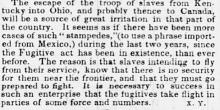WASHINGTON.
Mr. Baring's Visit––A Dinner at Mr. Corcoran's in his Honor––Progress of the Campaign––Flight of Slaves.
Correspondence of the New-York Daily Times.
WASHINGTON, Thursday, Sept. 30, 1852.
Although the English press has carefully disclaimed for Mr. BARING any diplomatic purposes in visiting the United States, there are good reasons for ascribing to him such objects. As a gentleman, almost at the head of the banking interest of London, he is peculiarly concerned in the settlement of several questions now pending between the United States and Great Britain, and I look upon him as a sort of scout to make observations upon the enemy's camp. His house, in common with every other of its character in England, is a large holder of Spanish bonds, some of which pay nothing, and on the remainder of which the revenues of Cuba are held in pledge. Mr. B. wishes, it may be presumed, to ascertain by ocular inspection how long this Republic is likely to consent to dow without Cuba; that is to say, to find out how long he and his clients are likely to receive their dividends on Spanish actives. Our new habit of settling disputes involving the commercial rights of our citizens in foreign countries, in the back parlors of Threadneedle-street and Change-alley, has also given to Mr. BARING's mission some importance. His house holds or represents the holders of nearly all Peruvian Bonds. Whatever diminishes the heaps which appear to form the basis of Peruvian credit, lessens the security of those obligations. The manifesto brought out by a recent steamer, which is regarded as the declaration of a poudrette war upon foreign agriculture, may give occasion to negotiations here in which Mr. BARING's advice will be useful to Mr. CRAMPTON and profitable himself. Added to these motives for sending hither at this time a Special Commissioner, with at least a semi-official character, we have many questions of grave financial importance growing out of the several grants and contracts for the Tehuantepec Canal and Railroad, in which the British capitalists are largely interested, the affairs of the Nicaragua Canal, and the vast Railroad Loan of the United States, of which probably not less than $150,000,000, in Stocks and Bonds, are held in this country. Under these circumstances, it is not surprising that Mr. BARING's visit has created a sensation. A dinner was given him by W.W. CORCORAN on Monday last, at which the acting Secretary of State, and all the other Cabinet Ministers in town, were guests. What negotiations have yet taken place, if any, has not yet transpired.
The last sign of Whig's disaffection has disappeared. That was the movement to use Mr. WEBSTER's name to his own discredit and to the injury of the Whig candidate. No complete electoral ticket seems to have been formed everywhere. I have seen a letter from Georgia, which put such a ticket in nomination, which declares that the whole proceeding was still-born, and met with no response from the people of Georgia. Some of the persons nominated as electors have declined, and not a hundred votes in the States will be diverted, by this cause, from Gen. SCOTT. The divisions of the Democrats, which at one time appeared to be smothered, have broken out in earnest, and without any prospect of their effectual suppression before the day of the election. There is no good reason to expect that Georgia will vote for General SCOTT. The new voters brought into political being by the Constitution which Virginia last year sensibly gave herself, are manifesting their preference for Gen. SCOTT by thousands, and will perhaps turn the scale in that State. The truth of what I have constantly asserted from the beginning of the canvass between the competitors for a nomination to this time, to wit: that Gen. SCOTT would carry more Southern votes than any other Whig, is now universally acknowledged.
The escape of the troop of slaves from Kentucky into Ohio, and probably [probably] thence to Canada, will be a source of a great irritation in that part of the country. It seems as if there have been more cases of such "stampedes," (to use a phrase imported from Mexico,) during the last two years, since the Fugitive act has been in existence, than ever before. The reason is that slaves intending to fly from their service, know that there is no security for them near the frontier, and that they must go prepared to fight. It is necessary to succeed in such an enterprise that the fugitives take flight in parties of some force and numbers. X.Y.
"Washington - Flight of Negroes," New York (NY) Times, October 4, 1852, p. 2

